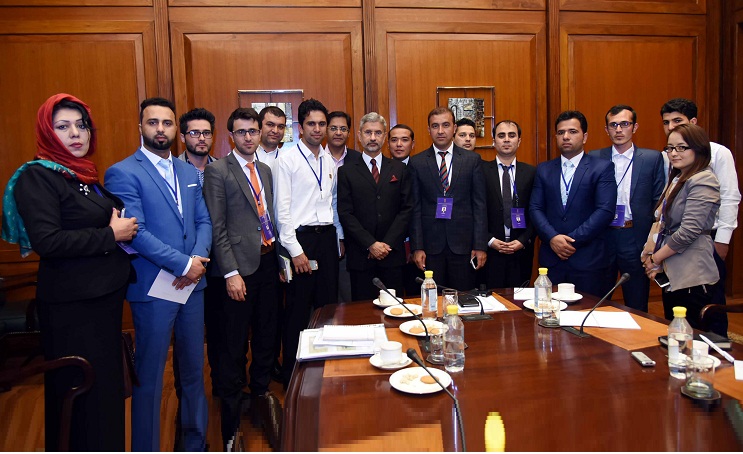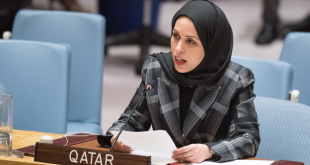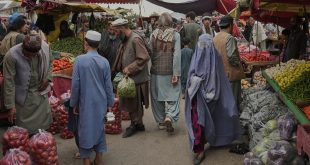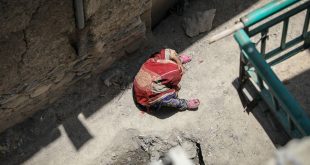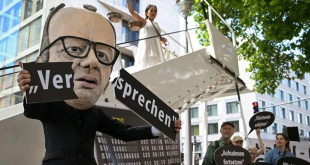By Abdul Saboor Sarir-KABUL: Hundreds of Afghans visit India every year for different reasons. However, one thing is crystal-clear that they feel at home when they are in India. No fear of arrest or discrimination multiplies their joy. Their worries vanish there. For Afghans, India is second home of Afghans.
There is no denying to the fact that India is our time-tested friend. Our recent trip to different cities of India had strengthened this belief; though it was not my first visit. Interactive discussions with state officials, journalists, businessmen and locals had this trip different and interesting than the previous tours.
In late April, I was included in the list of Afghan journalists’ delegation invited to India to gain new experiences and groom their skills. The visit was also important for Afghan people and government because what the delegation has learnt can change fate of the nation if applied in letter and spirit.
Embassy of India in Kabul contacted me to prepare for the unforgettable visit. I wanted to be part of the delegation because the visit was of utmost importance due to the meetings with important Indian officials. It was an opportunity to learn from Indian institutes and authorities that how they are doing better than many developed countries. In education, health, agriculture, security and other sectors the Indians are doing better than South and Central Asians. They are working at key posts in Gulf countries. In the field of computer science they had stunned the world.
In a nutshell, from the India’s foreign ministry to National Disaster Management Authority, it was a productive visit to update ourselves. We left Kabul at 2:40 p.m. on April 23. The delegation comprised of 14 journalists, including two female news reporters. From Indira Gandhi International Airport in New Delhi, we went straight to the hotel. The foreign ministry was very generous to provide comfortable accommodation to the delegation. One thing is clear that we are not the only nation best known for hospitality, but Indians share the same trait.
On April 24, we went to Agra to see the majestic Taj Mahal. The mausoleum was built by Mughal emperor Shah Jahan in memory of his third wife, Mumtaz Mahal. It is a symbol of eternal love. The white dazzling minarets of Taj Mahal are the witness of historical relations between the two countries.
It was not the Taj Mahal which made us to keep silence and think for several minutes. Actually, it was love of Indian people for their history. They are striving hard to prevent these historical sites from losing colors. The first question that pops up into mind is that how they do it? It is followed by: Can we do the same?
In Afghanistan there are many historical places but the government failed to renovate them. India has maintained beauty of Taj Mahal. They love their history because it reminds them of their worst and golden moments. These places are part of their history. Afghans are also a lengthy chapter of this history. However, we are far behind our Indian brothers and sisters in this aspect.
The protocol was amazing. We had a guide and a security official. In Afghanistan media organizations, threatened by the Taliban, even don’t enjoy state security. Thus, it made us to feel more secure than back in home of office.
After storing memories we came back to New Delhi to take nap. The following day, on April 25, we visited the Ministry of Foreign Affairs of India.
The joint secretary and spokesperson, Wikas Swarup, was the first to welcome us with open arms. The ever-smiling and keen listener Swarup briefed the delegation on media in India. According to him, Prime Minister Narendra Modi is the second most famous leader in the world on social media. The number of his followers is growing every day. This information made us to ponder over popularity graph of our own leaders. After a taking a long breath we turned our inquest minds again to Mr Swarup. “We have an active and quick team to respond to the queries of people on social media,” he said.
He also briefed us on total number of media outlets in India. Mr Swarup was very clear about the ministry’s stance on Pakistan in relation to Afghan-India relations. He made it clear that India has many more issues than Pakistan to be concerned about. After giving a happy ending to the briefing, we were blessed with the presence of Foreign Secretary Subrahmanyam Jaishankar. This meeting was of utmost important for us because we wanted to know about current status and future of Afghan-India relations, especially after the recent developments in the region such as formation of the Quadrilateral Coordination Group, emergence of the Islamic State in Afghanistan and development of Iran’s Chahbahar Port. Born in January 1955 and a seasoned diplomat, the foreign secretary greeted us as he knew us since childhood.
It was an interactive meeting because the secretary was friendly to answer the questions posed by the delegation. Literally, he was bombarded with questions.
He said that India was not working in Afghanistan because of Pakistan but Afghan-India are historical allies. The foreign secretary said that small and mega developmental projects initiated by the Indian government in Afghanistan would be completed soon. He said that India was not only working in Afghan areas along the Durand Line but also in other parts of the country such as Bamiyan province. A consortium of six Indian companies has won the concession for three iron ore mines in the Hajigak area of the province.
India’s Ambassador to Kabul, Manpreet Vohra, was also present on the occasion. The delegation asked him about change in the visa regime for Afghans.
The Indian ambassador said that the embassy has just changed the procedure to avoid any untoward situation or prevent terrorists from landing on Indian soil. “A person applying for Indian visa shall know where he will stay and why he is going to India,” he said. His answer removed the confusion that we had.
After the meeting we embarked upon another interesting short journey. The delegation visited the Times of India. The senior editors briefed the delegation on circulation of newspaper and its competitors.
It’s the third largest newspaper in India by circulation and largest selling English language daily in the word.
They also asked questions about rights of journalists in Afghanistan. They showed us different departments.
Looking at the office and observing the number of employees, we thought as Afghan journalists are still living in the Stone Age. We neither have security nor facilities and nor thousands of educated readers.
To stick to the schedule, we visited the All India Radio (AIR) on the same day. It was established in 1930.
AIR has covered more than 90% of the Indian population as per the latest information given by the ministry of Information and Broadcast. And it’s one of the largest radio networks in the world.
The management had briefed the delegation on the numbers of its followers. Due to competition and the age of IT, the radio has developed applications for smart phones (iOS and Android) to compete. They showed us different departments of the radio as well.
On the morning of April 26, we visited the Institute for Defence Studies and Analyses (IDSA). It is an Indian think tank for advanced research in international relations. It was established on November 11, 1965.
Jayant Prasad, the director general for IDSA, said that New Delhi would continue supporting Kabul for development of Afghanistan. “There is no plan for India to withdraw. We will continue our assistance with our Afghan friends in Afghanistan in construction to build public centers and in funding projects,” he said.
The institute briefed on relations between the two countries. The office-bearers said that it was up to the Afghan government to include India in the Afghan-owned peace process.
Most of the questions and answers were pertaining to Afghan peace process. Afghan journalist also said that internal factors were also hampering the peace process. Other topics such as mass exodus of Afghan youth were also discussed.
Later we visited the state-of-the-art Apollo Hospital. We visited different sections of the hospital. The management said that they are providing better treatment facilities to Afghans. “We are treating them like our own brothers,” the management said.
After the visit to the hospital it was time to kill our hunger. The dinner was hosted by Wikas Swarup. Indian journalists were also invited. Birds of a feather flock together. So, it was a moment of delight for us. Journalists of the two countries at the dinner interacted to become professional friends and interact in the future.
On April 27, we woke up early in the morning because it was another important day to gather information like a novelist with no idea. The first organization we visited was the Election Commission of India. It is crystal-clear that India is a socialist, secular, democratic republic and the largest democracy in the world. The commission was established on January 25, 1950. The officials briefed the delegation on registration of voters, polling stations and other relevant issues.
They suggested that without registration of voters and polling station one cannot guarantee successful elections in Afghanistan. They had several arguments to support their theory about fair and transparent polls in Afghanistan. Their arguments convinced us. The voters shall know where they can cast ballots.
Indian consultants also worked in Afghanistan’s Independent Election Commission. They are ready to help Kabul if asked for services.
After the election commission we went to the National Disaster Management Authority (NDMA). It was established in December 2005. It is an agency of the Ministry of Home Affairs whose primary purpose is to coordinate response to natural or man-made disasters and for capacity-building in disaster resiliency and crisis response.
NDMA has emergency units at district and national level.
The authority is ready to respond to natural disasters in South Asia. The NDMA is interacting with Afghanistan’s disaster management authority. However, the authority cannot train the Afghan officials because it is duty of the Indian foreign ministry to sign cooperation agreement in this regard. Shields to the journalists were awarded at the end of the NDMA tour.
Another surprise was waiting for the Afghan delegation—visit to CNN-IBN, an English-language news and current affairs television channel based in Noida, Uttar Pradesh. We had healthy interaction with editors of the CNN-IBN. Afghanistan direly needs such news channel for image building and promotion of English journalism.
After busy schedule, on April 28 the Afghan journalists had the opportunity to throng to shopping malls in New Delhi. Some went for sightseeing. We were lucky to kill two birds with one stone—shopping and sightseeing.
On the same evening we left for Dehradun by road. It was an eight hour journey because leaving New Delhi and amending the schedule took two hours. Thanks to the ignorance of our colleagues.
The next morning on April 29, we woke up early, though we were tired after the eight hours journey. We made the first visit to the Indian Military Academy also known as IMA. The academy trains army officers. IMA was established in 1932. Nearly 5,000 cadets from India and 17 other countries are trained at the academy. Nearly, 3,000 Afghan officers graduated from the academy. Currently, 107 Afghan army officers are going under training at the IMA. They are trained on modern lines.
According to an Afghan army officer at the IMA, every student learns how to swim and at the end of semester. The student had to swim 35 meters. Repeated failure of the cadet forces the management to expel the offer from the academy. Soldiers are born to be tough. Therefore, the academy prepares them for battlefield where enemy shows no mercy. It is long-term counter-insurgency support of India for Afghan people.
Afghan cadet at the academy said that they are treated well and are happy. We also visited the military museum, swimming pool and horse riding training areas at the IMA, besides other sections. When we went to the martyrs’ monument where pictures of the missing and martyred soldiers are placed, the first thought that came to our mind was that India is a great country because of these sacrifices. Pictures of two soldiers killed in Afghanistan in attack on the Indian embassy in Kabul were also placed on the monument. We were told that a soldier must place a floral wreath at the monument to begin the academy’s daily session.
Later we visited the Forest Research Institute. It is an institute of the Indian Council of Forestry Research and Education and is a premier institution in the field of forestry research in India. It was founded in 1878 British Imperial Forest School by Dietrich Brandis. In 1906, it was re-established as the “Imperial Forest research Institute”, under the British Imperial Forestry Services. Museum in the institution was a point of attraction for the delegation. A 730 years old tree trunk was there for public display. The visit was very informative for Afghan journalists. Afghanistan direly needs such a research center. The visit ended with comprehensive notes taking.
The next place to visit was the Indian Institute of Petroleum. It was established in 1960. The institute is devoted to multidisciplinary areas of research and development in the downstream sector of hydrocarbon and related industry. The kind scientists briefed us on the modern technology and about functions of different laboratories in the institute. They have shown us different products. Emphasized was paid on reducing carbon emission to keep environment clean and reduce global warming. New machinery has been installed in the institute to produce petrol from plastic shopping bags.
On April 30, we went for sightseeing to Masoorie to give a happy ending to the trip. It is a hill station in Dehradun district. It is situated in the foothill of Himalayan range. Kempty Falls touched our hearts. For nature lovers like us, it was a blessing to hug the waterfall. Unfortunately, we cannot hug it but captured it in our smart phones and cameras to live with happy memories for the rest of our lives.
This place is paradise on the earth. We recalled the commercial “Incredible India” which was run on the National Geographic channel. Indeed, India is incredible because it is blessed with such places. Afghanistan has also such places, perhaps, more but the government is not paying attention to promote the tourism industry. Insecurity is adding to the problem.
We had the opportunity to meet with the renowned Indian writer, Ruskin Bond, at the Cambridge Book Depot. We bought a few books of Ruskin Bond. He was glad to meet us. Thus, the bonus was his autograph with love. As our family members and friends were looking for gifts more than our arrival, therefore, we went to shopping centers there.
On May 1, we left Dehradun for New Delhi. On the same day we arrived at Hamid Karzai International Airport in Kabul.
However, the trip was informative and satisfactory. Some journalists were not happy with the schedule which was very tight, especially when the temperature is high above normal. The Indian foreign ministry shall try to keep schedule of future visits a bit relaxing.
 Afghanistan Times
Afghanistan Times
